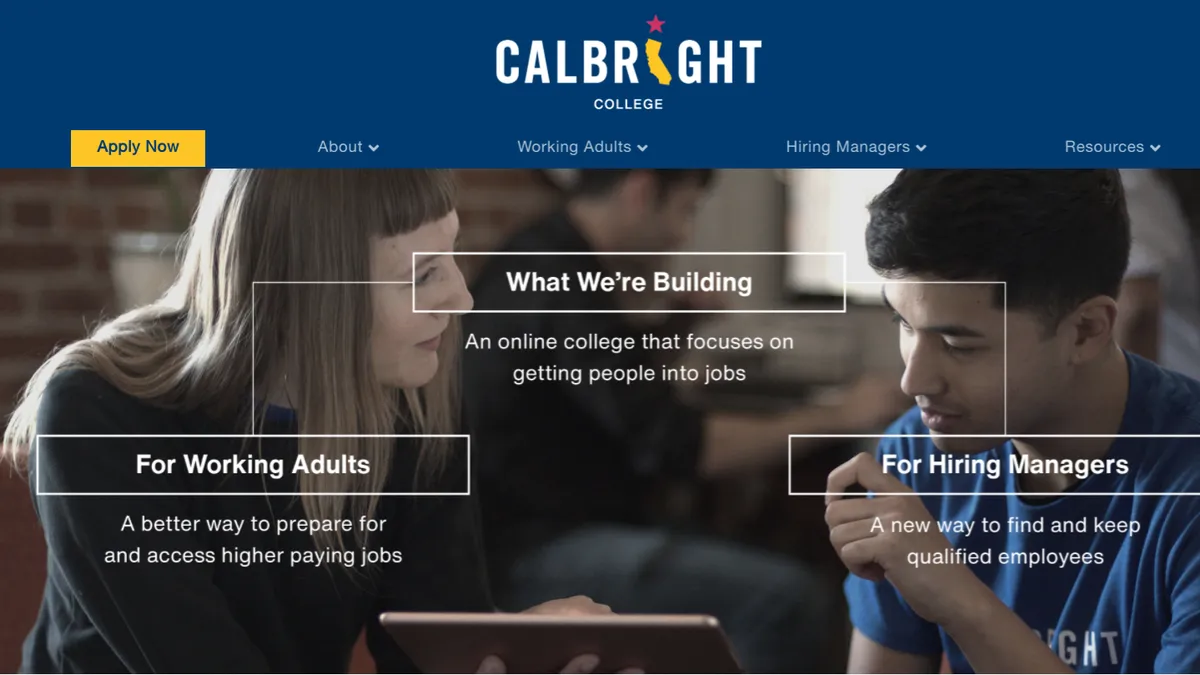Dive Brief:
- The president and CEO of Calbright College, California's newly launched online public college targeting working adults without degrees, resigned Monday from her position effective March 31, a spokesperson told Education Dive.
- Heather Hiles, who has a background in ed tech, was hired in February 2019 to launch and lead the experimental addition to the California Community Colleges System (CCC). She will be on leave until her resignation date. The reason for her departure was not disclosed.
- The board of trustees unanimously accepted her resignation Monday during a meeting closed to the public. The news comes just a few months after classes began at the college in October.
Dive Insight:
Calbright, which was created to serve working adults who have not earned a degree, offers credentials designed to teach students in-demand skills. California's legislature earmarked $100 million for its launch and $20 million annually for its expenses.
Hiles received a four-year contract with a base salary of $385,000, EdSource reported. The board plans to appoint an interim CEO until it hires a permanent replacement, according to a statement released by Tom Epstein, president of Calbright's board of trustees and of CCC's board of governors.
"Our board appreciates the leadership provided by Ms. Hiles during her tenure as Calbright's chief executive officer," he wrote. "She led the launch of the start-up college that has already enrolled hundreds of students ... (and) [s]ystems are in place to expand operations over time."
The college hopes to eventually have "tens of thousands" of students enrolled in its self-paced programs, Taylor Huckaby, the school's communication director, told Education Dive in September. However, it expected a gradual start, he said.
Calbright currently enrolls more than 430 students. When it opened to students on Oct. 1, roughly 700 applicants expressed interest in its programs — hundreds above the 400-student cap the college had settled on for its initial cohort, EdSource reported at the time.
Huckaby told Education Dive that Calbright accepted those students on a first-come, first-served basis.
So far, the college has 33 full-time employees and is hiring for more than 60 positions across the institution.
During a portion of its meeting Monday that was open to the public and available via livestream, the board of trustees questioned and criticized the college's hiring process. One board member, Bill Rawlings, said Calbright officials were "clearly overwhelmed" in their attempts to fill jobs.
Calbright is also still not accredited, though it has until the legislated deadline of April 2025 to achieve this status.
The college is in the "initial stages of preparing to submit an application for eligibility to pursue national accreditation with the Distance Education Accreditation Commission (DEAC)," Huckaby wrote in an email to Education Dive.
Once the school is accredited through DEAC, it will be able to access federal financial aid for nondegree credentials, according to a presentation given to board members Monday.
In the meantime, students won't be able to transfer credits they earned at Calbright to another institution. Huckaby previously told Education Dive that the college was making sure students knew about its lack of accreditation.
Calbright is one of several public colleges that have opened to serve online-only students and have targeted adult learners.
Purdue University acquired the for-profit Kaplan University in 2018 to create an online college, Purdue University Global. The University of Maryland Global Campus, formerly known as the University of Maryland University College, plans to spend $500 million to expand its reach nationally. And the University of Massachusetts System has expressed interest in developing its own online college for adult learners.















